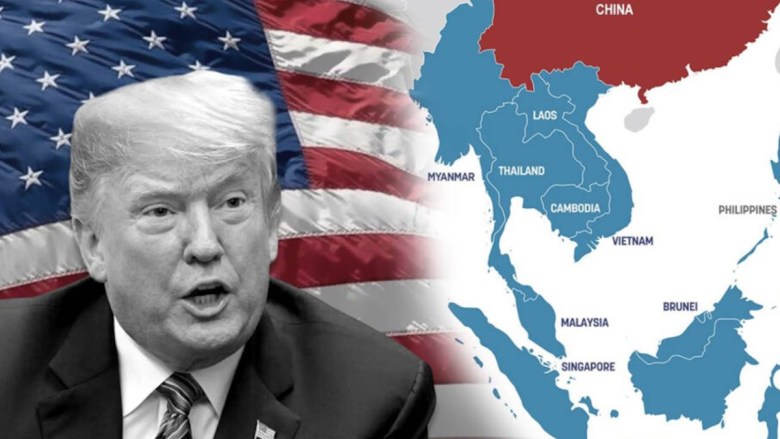Politics
Trump’s Asia Tour Reinforces US Commitment to ASEAN Strategy

US President Donald Trump completed a six-day tour of Asia, marking his longest foreign trip during his second term. His participation in the 47th ASEAN Summit in Kuala Lumpur, along with the APEC Leaders’ Meeting in South Korea, and discussions with Japan’s new Prime Minister Sanae Takaichi, signified a critical moment for the United States to reinforce its Indo-Pacific strategy amidst rising global tensions.
The Indo-Pacific region is experiencing significant change, driven by China’s increasing assertiveness in maritime affairs, economic coercion, and technological competition. For smaller Southeast Asian nations, these shifts underscore the importance of ASEAN’s role as a diplomatic hub, aimed at providing its members with autonomy and protection from major power pressures. ASEAN-led forums, such as the East Asia Summit and the ASEAN Regional Forum, facilitate dialogue among key players including the US, China, Japan, and India.
Despite these efforts, ASEAN’s consensus-driven decision-making process often hampers its ability to respond cohesively to Beijing’s aggressive tactics. China’s maritime militias, economic pressures, and strategic investments challenge ASEAN unity. As Malaysia’s Foreign Minister highlighted, the bloc’s neutrality faces erosion as global powers vie for influence. Countries like Cambodia and Laos rely heavily on Chinese financial support, while Vietnam and the Philippines are increasingly aligning with Washington. This divergence complicates ASEAN’s efforts to present a united front, especially as regional security threats escalate.
Reaffirming America’s Role in Southeast Asia
Trump’s trip underscored that the US considers ASEAN a vital component of its Indo-Pacific strategy. However, this approach must be supported by broader coalitions. While ASEAN can lead discussions and establish norms, it lacks the military deterrent necessary to ensure regional stability. That responsibility is increasingly falling on the United States and its alliance network.
Through initiatives like AUKUS—an agreement between the US, the United Kingdom, and Australia—and the Quad involving Japan, India, and Australia, Washington and its partners are enhancing their capabilities to deter potential aggressors and safeguard maritime security. AUKUS, in particular, should seek collaboration with ASEAN nations on issues such as maritime awareness, cybersecurity, and emerging technologies, reinforcing deterrence while respecting ASEAN’s preference for inclusive, non-aligned strategies.
Trump’s meeting with Prime Minister Takaichi indicated a revitalized US-Japan alliance. Takaichi, often referred to as Japan’s “Iron Lady,” has committed to increasing defense spending and adopting a firmer stance against China’s military actions in the East China Sea. Coupled with the expansion of the Enhanced Defense Cooperation Agreement with the Philippines—facilitating US access to nine bases near Taiwan and the South China Sea—this development enhances the deterrence network throughout the Indo-Pacific.
ASEAN’s Economic Significance
Singapore’s founding Prime Minister, Lee Kuan Yew, once described ASEAN as “the lynchpin in Asia’s role in a globalized economic world.” Today, this characterization remains relevant as ASEAN collectively generates approximately $4 trillion in GDP, making it the fifth-largest economy globally. With nearly 700 million people, the majority of whom are under 30, the region stands as a dynamic center for growth.
The US has substantial economic interests in ASEAN. In 2023, US goods exports to the region reached $125 billion, with services exports at $58 billion and total investment amounting to $74 billion. This investment represents roughly one-third of all foreign direct investment in Southeast Asia, illustrating the region’s integral role in global supply chains, digital commerce, and industrial resilience.
As the region navigates maritime incidents, cyber threats, and economic pressure, ASEAN’s greatest strength lies in its commitment to dialogue and conflict prevention. Yet, with the increasing complexity of security challenges, dialogue alone may not suffice. Washington must continue to bolster ASEAN’s diplomatic capabilities while fostering coalitions that can act decisively when ASEAN cannot.
Trump’s participation in the ASEAN and APEC summits transcended mere ceremonial presence; it signaled that Southeast Asia is central to America’s Indo-Pacific vision. As great power competition intensifies, both ASEAN’s relevance and US credibility will undergo renewed scrutiny. The challenge for Washington is to move beyond symbolic gestures and engage in meaningful trade, infrastructure investments, and consistent diplomatic outreach. This approach is essential for establishing a truly strategic, solid, and enduring presence in Southeast Asia.
David A Merkel is a visiting distinguished fellow at the College of Charleston and an Associate with LSE IDEAS. He previously served as the US Deputy Assistant Secretary of State and director on the National Security Council.
-

 Lifestyle3 months ago
Lifestyle3 months agoHumanism Camp Engages 250 Youths in Summer Fest 2025
-

 Sports3 months ago
Sports3 months agoDe Minaur Triumphs at Washington Open After Thrilling Comeback
-

 Business4 months ago
Business4 months agoKenvue Dismisses CEO Thibaut Mongon as Strategic Review Advances
-

 Sports4 months ago
Sports4 months agoTupou and Daugunu Join First Nations Squad for Lions Clash
-

 Top Stories4 months ago
Top Stories4 months agoColombian Senator Miguel Uribe Shows Signs of Recovery After Attack
-

 World4 months ago
World4 months agoASEAN Gears Up for Historic Joint Meeting of Foreign and Economic Ministers
-

 Business3 months ago
Business3 months agoOil Prices Surge Following New EU Sanctions on Russia
-

 Health3 months ago
Health3 months agoNew Study Challenges Assumptions About Aging and Inflammation
-

 Entertainment3 months ago
Entertainment3 months agoDetaşe-Sabah Violin Ensemble Captivates at Gabala Music Festival
-

 Entertainment3 months ago
Entertainment3 months agoBaku Metro Extends Hours for Justin Timberlake Concert
-

 Business3 months ago
Business3 months agoU.S. House Approves Stablecoin Bill, Sends to Trump for Signature
-

 Top Stories4 months ago
Top Stories4 months agoRethinking Singapore’s F&B Regulations Amid Business Closures









